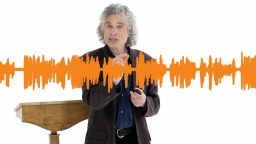All Videos
All Stories
Professor Steven Pinker illustrates how the study of linguistics can give us a rare window into the conscious mind.
▸
50 min
—
with
Professor Tamar Gendler uses the work of three titans of the discipline — Thomas Hobbes, John Rawls, and Robert Nozick — as a lens to guide us through the taut debate over the role of government in society.
▸
44 min
—
with
What if we could find one single equation that explains every force in the universe? Professor Michio Kaku explores how physics could potentially shrink the science of the big bang into an equation as small as E=mc².
▸
42 min
—
with
In his lecture, Professor Joel Cohen teaches you how demography can provide answers to the life or death questions caused by the world’s swelling population and dwindling resources.
▸
43 min
—
with
Best-selling author Kabir Sehgal explores the future of money during the age of space tourism and explains why it’s better to pay attention to predictions of science-fiction than those of economists.
▸
3 min
—
with
Khan Academy founder Salman Khan explains how always dreaming big and setting audacious goals got him to where he is today.
▸
2 min
—
with
Actress and comedian Maysoon Zayid, who lives with cerebral palsy, says that the disabled are the largest minority group in the world, and the only one you can join at any time.
▸
6 min
—
with
As religiosity plays a major role in American society, Barney Frank advises other atheist politicians not to draw too much attention to the word “atheist” because it is too often perceived as a repudiation of religion (and, therefore, American values).
▸
3 min
—
with
Trolling isn’t just the actions of ornery black sheep on the web. Jonathan Zittrain explains that it’s a set of behaviors due to be studied more intently in the coming years.
▸
7 min
—
with
Entrepreneur Peter H. Diamandis discusses his work with the new company Human Longevity Inc., which seeks to extend the healthy human lifespan.
▸
2 min
—
with
Habits play a major role in determining our levels of happiness, explains best-selling author Gretchen Rubin.
▸
4 min
—
with
Economist Thomas Piketty delves into several common misconceptions about free market economics and argues that strong public institutions are necessary for market regulation.
▸
4 min
—
with
Microsoft Director of Search Stefan Weitz explains that the future of machine learning consists of teaching artificial intelligence to identify and patterns.
▸
4 min
—
with
Arianna Huffington describes what she calls “the third women’s revolution”: a transformation of the world and its social values in order to suit both genders.
▸
2 min
—
with
What were the first organisms to have sex? We may never know the answer, but as Bill Nye explains in this Big Think interview, scientists are very interested in why sexual activity remains so popular in nature beyond the obvious reproductive implications.
▸
4 min
—
with
Jason Silva, host of National Geographic Channel’s “Brain Games,” calls marijuana legalization a huge win for civilization.
▸
7 min
—
with
Former NASA astronaut Ron Garan explains how the cooperative lessons learned through space exploration are applicable in other realms of life.
▸
2 min
—
with
There are 21 strategies for changing habits, says author Gretchen Rubin. The most fun is one that incorporates the usage of treats.
▸
2 min
—
with
Salman Khan, founder of the Khan Academy, explains that the aims of online education don’t differ much from those of traditional learning.
▸
2 min
—
with
Slavoj Žižek draws from examples in literature, film, and advertising to explain a phenomenon in which no sexual liaison is complete without a third element — an intruder, something like a fantasy.
▸
5 min
—
with
Tightrope artist Philippe Petit explains the importance of teaching kids the power of intuition.
▸
2 min
—
with
Higher and more equitable growth in the United States requires more public support for higher education, argues economist and best-selling author Thomas Piketty.
▸
3 min
—
with
Former Citigroup CEO Vikram Pandit explains how new forms of data science that explore causality can be used to assist people by diagnosing harmful behaviors.
▸
6 min
—
with
Harvard Law Professor Jonathan Zittrain dissects the recent FCC net neutrality decision and asks whether it’s nearly as earth-shattering as many of us suppose.
▸
4 min
—
with
When he watched his close friend, one of the toughest of the tough in his Navy SEAL basic training class, fall to pieces after deployment to Afghanistan, Eric Greitens knew he had to write a book on resilience.
▸
3 min
—
with
Bestselling author Gretchen Rubin explains that habits are “like the invisible architecture of everyday life,” a topic she explores in her new book Better Than Before: Mastering the Habits of Our Everyday Lives.
▸
4 min
—
with
Microsoft Senior Director of Search Stefan Weitz discusses the future of search technology.
▸
4 min
—
with
Legendary dancer Carmen de Lavallade recounts the process that led to the development of her current project, the autobiographical theatre/dance show “As I Remember It.”
▸
4 min
—
with
Tech expert Michael Schrage calls voicemail “an anachronism” whose time has come and gone. Could e-mail be next?
▸
3 min
—
with
From a personal tutoring service for his young cousin, Salman Khan’s company Khan Academy has grown exponentially into a massive, global, online engine for learning.
▸
5 min
—
with





























